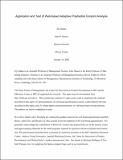Application and Test of Web-based Adaptive Polyhedral Conjoint Analysis
Author(s)
Dahan, Ely; Hauser, John; Simester, Duncan; Toubia, Olivier
DownloadVC_Appl&Test.pdf (791.5Kb)
Metadata
Show full item recordAbstract
In response to the need for more rapid and iterative feedback on customer preferences, researchers are developing new web-based conjoint analysis methods that adapt the design of conjoint questions based on a respondent’s answers to previous questions. Adapting within a respondent is a difficult dy-namic optimization problem and until recently adaptive conjoint analysis (ACA) was the dominant method available for addressing this adaptation. In this paper we apply and test a new polyhedral method that uses “interior-point” math programming techniques. This method is benchmarked against both ACA and an efficient non-adaptive design (Fixed).
Over 300 respondents were randomly assigned to different experimental conditions and were asked to complete a web-based conjoint exercise. The conditions varied based on the design of the con-joint exercise. Respondents in one group completed a conjoint exercise designed using the ACA method, respondents in another group completed an exercise designed using the Fixed method, and the remaining respondents completed an exercise designed using the polyhedral method. Following the conjoint exer-cise respondents were given $100 and allowed to make a purchase from a Pareto choice set of five new-to-the-market laptop computer bags. The respondents received their chosen bag together with the differ-ence in cash between the price of their chosen bag and the $100.
We compare the methods on both internal and external validity. Internal validity is evaluated by comparing how well the different conjoint methods predict several holdout conjoint questions. External validity is evaluated by comparing how well the conjoint methods predict the respondents’ selections from the choice sets of five bags.
The results reveal a remarkable level of consistency across the two validation tasks. The polyhe-dral method was consistently more accurate than both the ACA and Fixed methods. However, even better performance was achieved by combining (post hoc) different components of each method to create a range of hybrid methods. Additional analyses evaluate the robustness of the predictions and explore al-ternative estimation methods such as Hierarchical Bayes. At the time of the test, the bags were proto-types. Based, in part, on the results of this study these bags are now commercially available.
Date issued
2002-01Keywords
rapid, feedback, preferences, adaptive conjoint analysis (ACA), ACA, polyhedral method, interior-point, Pareto choice set, Hierarchical Bayes